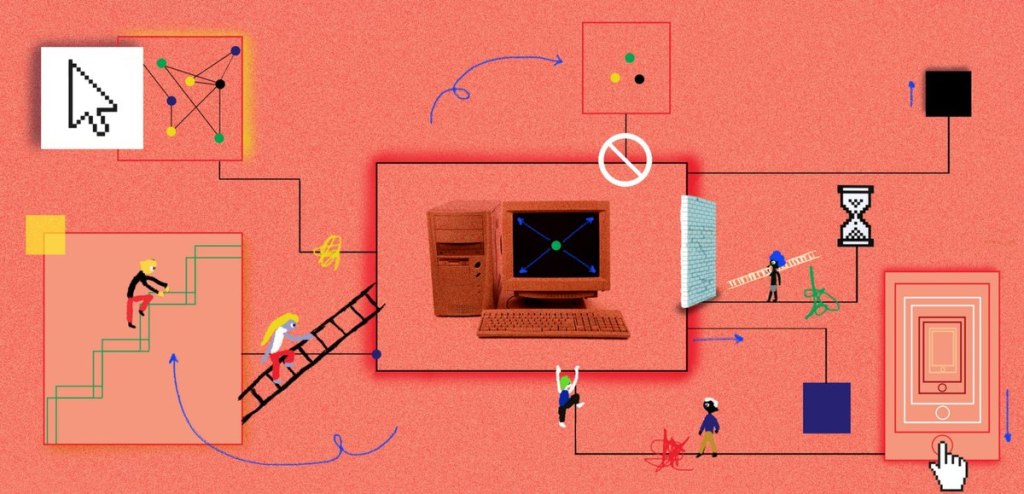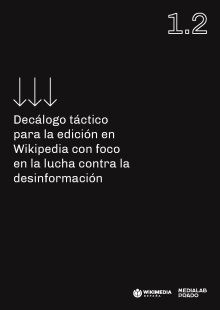
As Communications and Public Policy Manager at Wikimedia España, part of my job has to do with strategizing and designing methodologies to boost our working line on Fighting Disinformation in the Wikimedia projects. We started this pursuit in 2020, as part of our brand new Institutional Relationships & Public Policy Program, which I have the honour (and the challenge) to coordinate. Our focus so far has been building partnerships, analysing and understanding how disinformation is likely to affect Spanish Wikipedia. We have also been asking ourselves what we can do to mitigate its effects and what resources can we offer Wikipedians in order for them to join the fight.
In November 2020 we organized a 3-day-meeting with a bunch of journalists, researchers and activists who shared their expertise on the topic so that we are able to adapt some of their fighting-disinformation-methodologies to the free knowledge ecosystem.
We worked with heads of national and local data verification agencies such as EFE Verifica or Verificat. Scholars and researchers Lorena Cano (Postdoctoral researcher at the University of Valencia), Antonio García Jiménez (Professor of Journalism at Rey Juan Carlos University) and Dafne Calvo (PhD in communication) were also part of the team. And Sergio Salgado (Head of communication and networks at Xnet) brought the civil society prisma to the conversation.
The working team was completed with the participation of Wikimedians María Sefidari (President of the Wikimedia Foundation at the time), Florencia Claes (Vice-president of Wikimedia España at the time), Montserrat Boix (Journalist and Wikipedian) and myself.
To be honest, I wasn’t surprised when many of these partners stated that the way we have built the free encyclopedia was a reference for them and their work. After 20 years of sharing top quality information and knowledge with the world, Wikipedia shines for its community capacity to provide readers with transparency and reliability.
The balance between peer-to-peer review and the Wikipedian culture of referencing every fact presented in an article was also pointed out as a major first step for being able to identify disinformation campaigns or misinformation amongst Wikipedia content.
We are one of the communities many others look at for inspiration and best practices on access to knowledge. What if we add the obliteration of disinformation to the combo? As the conversation continued, I couldn’t stop myself from thinking: “We need to stimulate the creation of a culture of data verification between Wikipedia editors and readers.” Is it possible that we embrace data verification the same way we are geeks for references?
Thanks to this I Meeting About Fighting Disinformation in Wikipedia we were able to reflect on the proper questions and ideas to guide our next actions. The insights of top national and local data verification agencies, scientific research groups at major public universities, and civil rights activists were gathered and integrated into our methodologies. Members from the volunteer support group “Laboratorio Wikimedia de verificación de datos” together with experienced Wikipedia editors and admins as well took part in the meeting, as representatives of the Wikimedia Movement.
As a result of the union, by the end of 2020 we published two decalogues to fight disinformation in Spanish Wikipedia. They serve as guidelines for Wikipedia editors and guidelines for Wikipedia readers to make sure the information they share or consume in Wikipedia is fact-checked.
The suggestions presented in these decalogues are simple yet effective. And it’s accessible for everyone with an Internet connection to put them into practice and advocate for a disinformation-free Wikipedia. Actions as simple as looking at the references at the end of an article or making sure if the article has any template with any kind of content warning already make a great difference when consuming information.
On the editors side, actions such as double-checking content in fact-checking platforms, applying critical source curation or publishing a line about what information is not possible to verify are suggested as best practices.
These guidelines are provided as a theoretical framework, but how do we implement them in practice? We’ve been following the amazing work our colleague Rocio Aravena from Wikimedia Chile has been doing with secondary school teachers working with the decalogues. We will be providing an English version of the decalogues, which are precise to Spanish Wikipedia soon. This will be available in case anyone else from the Movement would like to adapt them to their language community specificities and don’t speak Spanish.
As well, we have dedicated part of 2021 to think and design new applications to fight disinformation in Wikipedia. In June, we organized the very first Verficatón in Wikipedia (something that could translate as a “verify-a-thon”) combining the usual edit-a-thon methodology with a new set of indicators that help address the verifiability of a Wikipedia article.
Prior to the event, Wikimedia España worked on translating the 20 suggestions from the guidance into quantitative and qualitative metrics that could be scored in a table. This helps review single articles or a set of articles concerning a specific theme. In our first pilot, we work on COVID-19 related information.
Researchers from the ScienceFlows group of the Universitat València, which focuses on research projects about disinformation and scientific communication, helped build the indicators. Those range from date of last edit to number of references, passing by metrics on community discussions or warning templates. The aim of using this system is, once again, promoting a culture of data verification among the Wikipedian community which edits and reads the encyclopedia.
Hopefully we will be able to share more details about this methodology after a second verficatón, which will take place before the end of 2021. If you want to learn more about our actions regarding fighting disinformation or want to collaborate with us, please feel free to contact us. In the meantime, you can download the Spanish version of the guidelines for Wikipedia editors and guidelines for Wikipedia readers right from Wikimedia Commons.

Can you help us translate this article?
In order for this article to reach as many people as possible we would like your help. Can you translate this article to get the message out?
Start translation
